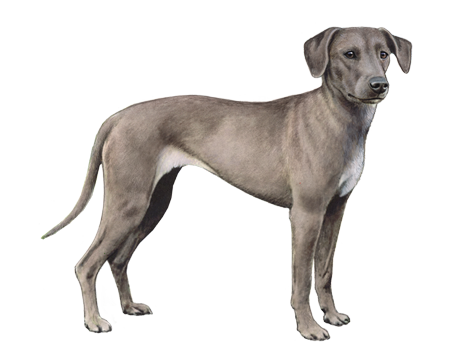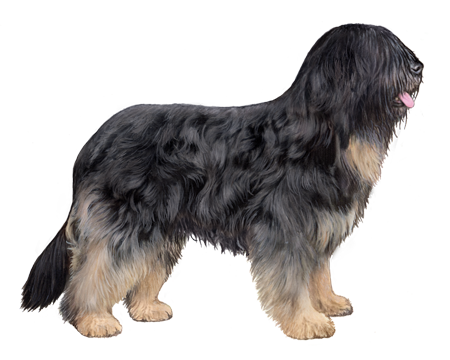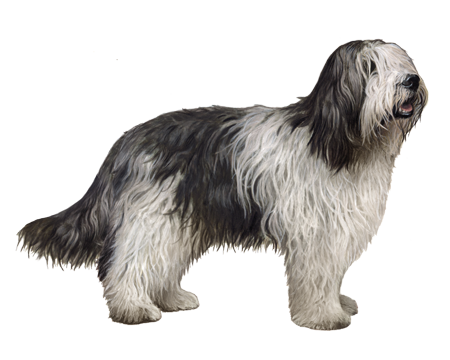
Border Collie
Border Collies are energetic, intelligent, and tenacious. Innate herding instincts have helped Border Collies remain popular as a working dog, but these active dogs make excellent companions that are eager to please their owners.
Interested in discovering if your dog is a Border Collie?
Check out Wisdom Panel's DNA tests.

Border Collie Traits
General Appearance
Border Collies are medium-sized athletic dogs with hard, muscular bodies, graceful and effortless movements, endless endurance, and an intense stare.
Coat and Colouring
Border Collies can have two different kinds of coats: rough or smooth. Both are weather-resistant with short, soft, dense undercoats, and top coats with straight or slightly wavy hair.
Rough-coated Border Collies can have variations in the length of their coats with feathered hair on the forelegs, haunches, chest, and underside; they also
Smooth-coated Border Collies have short hair covering their entire bodies
While black and white is the most common color pattern, Border Collies come in all colors and combinations of colors and markings, including red, sable, blue, brindle, white ticked, and merle variants.
Distinctive Physical Traits
Border Collies have solid, muscular bodies with straight, strong backs and deep chests. They have oval eyes; medium-sized ears that are set well apart and carried erect or semi-erect. Border Collies carry their already low-set tails when focusing on a task.
Border Collie Temperament
Border Collies are energetic, keen, alert, and responsive. While these dogs are serious about their work—and work is essential to their happiness—their affectionate personalities make them great companions.
Border Collies prefer active families and older, well-behaved children. Border Collies’ strong herding tendencies could lead them to chase cars, corral children, or herd other pets, and, despite their sociable natures, these dogs can be slow to warm up to strangers.
If you’re looking for a relaxed breed that would rather cuddle on the couch than hit the trails, Border Collies won’t be the right fit for you.


Border Collie History
The earliest mentions of the Border Collie dates back to the 1700s. The dogs guarded sheep along the border between England and Scotland, earning the ‘border’ in their name. Believed to be a mix of old Roman dogs and Viking Spitz breeds, Border Collies worked long days on rugged terrain.
Border Collies possess innate herding abilities. The dogs are capable of working without commands, out of sight from their owners. They gather and move livestock, using sweeping outruns, stalking-like movements, and an intense stare—known as the herding eye.
As greatest herders, Border Collies dominate sheepdog trials and are at the top of the pack in agility competitions; they also remain popular working dogs on farms around the world.
Border Collie Care
Nutrition
Feed Border Collies a high-quality dog food that is appropriate for their life stage (puppy, adult, senior). You should consider a diet formulated for active breeds. These high-energy dogs are not known for becoming overweight but portioning out their food with a measuring cup and limiting treats to no more than 10 percent of their daily calories can help keep Border Collies fit and trim.
Grooming
Both rough and smooth-coated Border Collies have waterproof double coats that require regular grooming. Brush them at least once per week to remove dead hair and keep their coats free of tangles, mats, and debris. When these dogs blow their coats, brush them with an undercoat rake several times per week. Keep their ears clean, and their nails trimmed.
Like all breeds, Border Collies benefit from a regular dental care routine that includes at-home teeth brushing and professional cleanings.
Exercise
Border Collies make great running companions and also enjoy brisk walks, hiking, swimming, and trips to the dog park. These highly intelligent dogs also excel in dog sports such as agility, obedience, rally, dock diving, and, of course, herding. Mental stimulation is important, too. Puzzle toys and other games help keep their minds engaged.
Training
Training and early socialization are a must for Border Collies. These dogs love spending time with their owners and will see training as a bonding experience. Border Collies are intelligent and keen to learn new things, which makes them excellent students. But, they need guidance to ensure their boundless energy is channeled in positive ways.
Focus on positive reinforcement and reward-based training and avoid repetitive activities, which will cause Border Collies to lose interest in training.

Border Collie Genetic Health Conditions
-
Trapped Neutrophil Syndrome
Trapped Neutrophil Syndrome (TNS) is a disorder of the white blood cells first identified in Border Collies.
-
Hereditary Calcium Oxalate Urolithiasis, Type 1
Hereditary Calcium Oxalate Urolithiasis, Type 1 (CaOx1) is a genetic disorder that greatly increases the risk for urinary stones composed of calcium oxalate to form within the kidneys or bladder.
-
Hyperuricosuria
Hyperuricosuria (HUU) is a condition that predisposes affected dogs to the formation of urinary stones, such as kidney or bladder stones.
-
Intestinal Cobalamin Malabsorption (Discovered in the Border Collie)
Intestinal Cobalamin Malabsorption (ICM) or Imerslund-Gräsbeck Syndrome is a metabolic disorder resulting from a failure to absorb vitamin B12 in the small intestine of the gut causing retarded growth, a low count of the oxygen carrying red blood cells (anemia), and a low count of white blood cells (immune system cells).
-
MDR1 Medication Sensitivity
The MDR1 gene variant causes a defect to a drug pumping protein that plays an important role in limiting drug absorption and distribution (particularly to the brain). Dogs with the MDR1 variant may have severe adverse reactions to some commonly used medications.
-
Neuronal Ceroid Lipofuscinosis 5 (Discovered in the Border Collie)
Neuronal Ceroid Lipofuscinosis 5 (NCL5) is a progressive neurological disorder characterized by uncoordinated movements, behavioral changes, vision loss, and epileptic seizures. The associated genetic variant has been identified in the Border Collie.
-
Sensory Neuropathy
Sensory neuropathy is a rare, severe neurological disorder caused by the degeneration of nerve cells. Affected dogs lack pain sensation, resulting in injury and self harm.
-
Dental Hypomineralization
Dental Hypomineralization is a disease that causes abnormal mineralization of the teeth, resulting in a brownish discoloration and abnormal wear of the teeth.
Knowing if your Border Collie is a carrier or at-risk for these conditions can help you and your veterinarian plan for your pup's lifelong care. With Wisdom Panel™ Premium, you can get results for over 200 genetic health tests.
Breed Group
Herding
The herding group is a diverse category. These highly intelligent breeds were developed to guard and control the movement of livestock.
Resources
https://www.akc.org/dog-breeds/border-collie/
http://images.akc.org/pdf/breeds/standards/Border_Collie.pdf
Reviewed 26 July 2020 by Annette Louviere, DVM























































